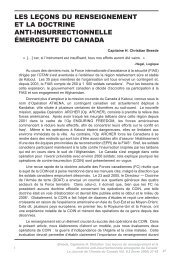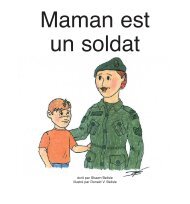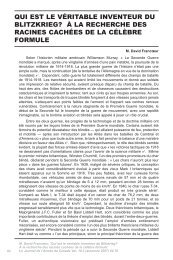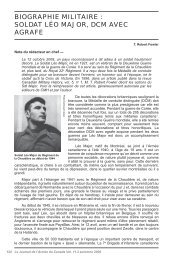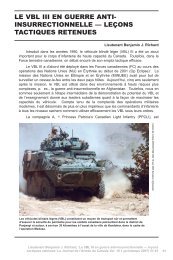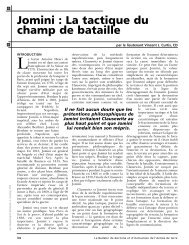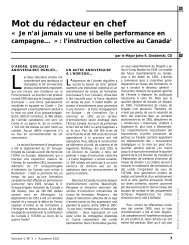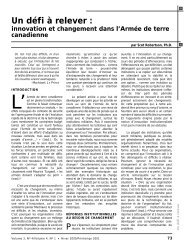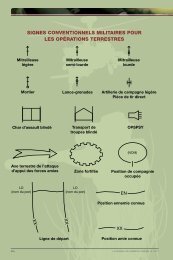The Canadian Army Journal
The Canadian Army Journal
The Canadian Army Journal
Create successful ePaper yourself
Turn your PDF publications into a flip-book with our unique Google optimized e-Paper software.
116<br />
using multi-disciplinary approaches to address problems. For example, he suggested<br />
that public security issues involved in protection against domestic terrorism are ripe for<br />
researchers with a background in psychology. 15 In the same vein, Arctic security, a topic<br />
that is currently en vogue in defence circles, is closely linked to CF operations but also<br />
has linkages to interdepartmental activities and perspectives that cross multiple<br />
jurisdictions. “<strong>The</strong> military aspect,” Dr Lindsey stated, “is only one side of the problem.<br />
Other aspects include the role of the economy, environmental changes, search and<br />
rescue, Inuit issues and <strong>Canadian</strong> sovereignty that need to be solved by looking at the<br />
matter from a holistic perspective.” 16 Although these issues were not always thought of<br />
in previous decades, the benefit of adopting such a multi-disciplinary approach is that it<br />
brings many different perspectives of the key players to bear on a problem to enhance<br />
common understanding, examine options and evaluate implications of those options<br />
during all phases.<br />
In the early days of OR, most of the analyses were original and tended to be<br />
conducted very close to the actual operational problem under investigation. To be<br />
useful, one needed to have a technical background, preferably with a radio or signals<br />
application, which an ordinary university graduate would not possess. A lot of the OR<br />
work tended to be done on an area or platform that was expanding, such as radar or<br />
navigation, and there was an immediate operational requirement for data that did not<br />
always exist at the time. 17 Whereas the focus of OR was on evaluating technical<br />
performance of equipment, a wide array of disciplines and research areas such as<br />
strategic studies, political science, sociology and military history are now used to<br />
address military problems. According to Dr Lindsey, greater consideration should be<br />
given to ‘soft’ skills not considered within the traditional realm of defence. Canada’s<br />
defence relations within NATO and our frequent participation on coalition and<br />
multinational operations highlight the importance of language and other ‘soft’ skills, such<br />
as personal interaction and communication, teamwork and leadership. <strong>The</strong> multinational<br />
character of NATO implies that there should be a shift in the focus of<br />
professional development in the recruits that enter the military: “not being able to<br />
understand or speak the same language is a terrible handicap. We need to have an<br />
understanding of the basics.” 18<br />
Guideline 2: Design capabilities with the widest possible objective in mind<br />
As the CF finds itself operating in a security environment that can be characterized<br />
as complex and volatile, it is important to stimulate discussion and debate on a continual<br />
basis as to the nature, choices and reasons underpinning Canada’s defence strategy.<br />
For example, the <strong>Canadian</strong> Navy became a great maritime power in the Second World<br />
War largely because of its anti-submarine warfare (ASW) role, which included OR work<br />
on sonar and research by the National Research Council (NRC) on ship design. 19 With<br />
the war over, and the Soviets undertaking a massive submarine building program, a key<br />
question arose: should the <strong>Canadian</strong> Navy retain its traditional focus by concentrating<br />
on ASW, or should more emphasis be placed on versatility, such as combating strategic<br />
ballistic missile submarines, escorting convoys, sealift, close support of ground forces<br />
and/or mine countermeasures? 20<br />
At several points in CF history, the military either disposed of, or was on the verge<br />
of divesting itself of, equipment only to find itself in a position of trying to re-acquire<br />
similar capabilities down the road (at a much greater cost) in order to maintain a<br />
contribution to world affairs. Canada’s long and sordid tale with acquiring search and<br />
rescue helicopters in the 1990s stands out as a recent example in modern memory. In<br />
order to avoid repeating this situation, Dr Lindsey maintained that it might be necessary<br />
to think about several different uses for a platform, system or capability versus a single<br />
<strong>Canadian</strong> <strong>Army</strong> <strong>Journal</strong> Vol. 11.1 Spring 2008


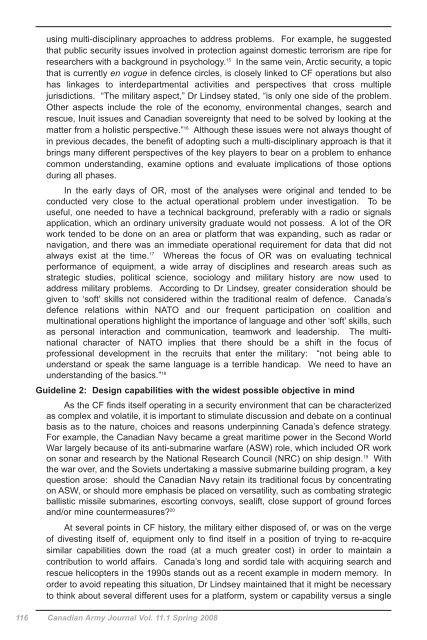
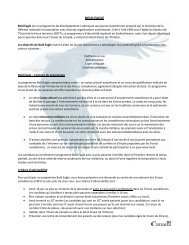
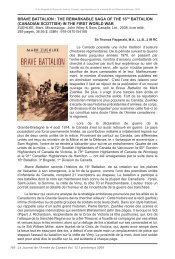
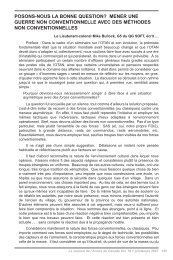
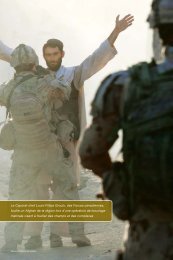
![La modularite dans l'Armee de terre canadienne [pdf 1.6 MB]](https://img.yumpu.com/17197737/1/188x260/la-modularite-dans-larmee-de-terre-canadienne-pdf-16-mb.jpg?quality=85)
